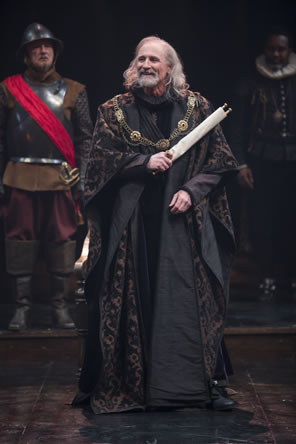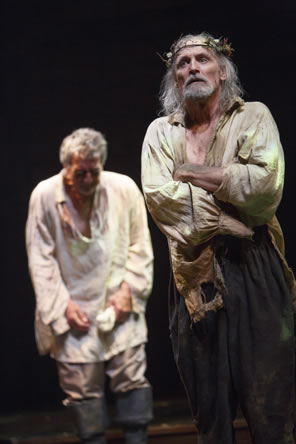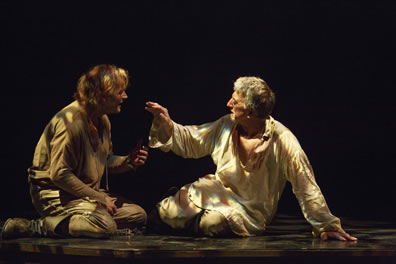King Lear
A King Lear in the Looking Glass
Stratford Festival, Festival Theatre, Stratford, Ontario
Thursday, August 28, 2014, Aisle 3, D–52&53 (left stalls)
Directed by Antoni Cimolino


King Lear (Colm Feore) from his first scene (top) to his encounter with the blind Gloucester (Scott Wentworth, bottom) remains "every inch a king" in his self-view of authority even as he descends ever deeper into madness in the Stratford Festival's production of William Shakespeare's King Lear at the Festival Theatre. Photos by David Hou, Stratford Festival.
So many electrons and so much ink lately have been expended on whether William Shakespeare's King Lear is still relevant. Commentators, noting the number of productions that have been mounted in the past 12 months with major stage/film/TV stars in the title role—and all those productions wanting in some way—think King Lear may be too thematically distant for us to fathom in the 21st century, too complex in its structure for us to comfortably consume, or simply too difficult to stage successfully with a gaping hole in its plot.
Really?
In fact, while all this critical consternation has been going on, a production has been proving King Lear's modern relevance, theatricality, and narrative quality, as well as its commercial viability by attaining record box office numbers. The Antoni Cimolino–helmed production at Canada's Stratford Festival is a King Lear that holds a glass up to today's world, exposing us to homelessness, an aging ruling class bankrupting future generations, and a younger generation that believes immediate riches to be its right. It is a King Lear that warns us of the nihilism awaiting societies in which self-absorption and moral superiority lead to schisms too politically wide and personally deep to heal. It has a King Lear, masterfully played by Colm Feore, who so accurately portrays the track to insanity our tears start flowing long before his first howl echoes across the stage.
Cimolino imprints only the slightest conceptual fingerprints on the play, but these are revealing. Before the play starts, three homeless men occupy the back of the stage. They wear dirty white clothes, warm themselves by a fire, defend their sleeping spots, and tussle over a ragged coat. We hear dogs barking and what could be traffic passing on an overpass. Modern? Yes and no, for during the play Edgar becomes one of their number as Poor Tom, and after he speaks the play's concluding lines—"The oldest hath borne most: we that are young shall never see so much nor live so long"—one of the homeless men comes to his side. Homelessness is a timeless phenomenon, though it ebbs and flows with economic tides; what's consistent is how we tend to ignore the homeless until they insinuate themselves into our play. (The 2009 Goodman Theater/Shakespeare Theatre Company production likewise addressed homelessness as a visual theme.)
Just as revealing is Cimolino's setting his King Lear contemporaneously to Shakespeare's 1606 England when the play was first staged (the legendary Leir ruled the Britons around 800 B.C.). In his director's notes, Cimolino points out that the London in which Shakespeare lived and worked was fraught with gurgling social schisms as the Puritans were gaining political power—schisms that would erupt into outright civil war within 40 years of Shakespeare writing King Lear. Designer Eo Sharp dresses the characters in Elizabethan costumes straight off a Nicholas Hilliard painting, but three characters, pointedly, wear Puritan fashions of that time: Edmund, Cornwall, and Oswald. The stage is bare save for occasional tables, chairs, and other props, but Lighting Designer Michael Walton creates a moody gloom once the play gets past its palace scenes and onto the heath, hovels, and hillocks of rural England. Walton also reminds us that Lear not only contends with the rain, wind, and thunder on the heath; he's out there on a treeless expanse with lightning flashing all around.
King Lear opens with a plot device that, unnecessarily, drives way too many critics and directors batty. King Lear, planning to retire and split his kingdom among his three daughters, demands to know which of them love him most. The two eldest, Goneril and Regan, wax eloquently about their devotion whereas the youngest, the most sincere of the three and the king's favorite, "cannot heave my heart into my mouth." For this, Lear disowns her and modern critics condemn her as cold, morally superior, narrow-minded, or stupid: If Cordelia would just say something nice to her father, none of the ensuing chaos would come. Yeah, and if the Titanic hadn't hit that durn iceberg …
I've long argued that Shakespeare was only interested in getting on with the play, so we should just accept his plot device and ride along. However, thanks to Cimolino's direction and Sara Farb's portrayal of Cordelia, I have a higher appreciation of Shakespeare's true intent with this scene. I'll summarize it as follows:
There once was a king with three daughters;
He asked each who loved him most.
The false elder sisters did glibly reply,
But the true-hearted youngest was toast.
King Lear starts out as a fairy tale, and, as in many traditional folk tales, the true-hearted youngest suffers through the indignities of the corrupt elders. Shakespeare also uses a fable for a plot device in The Merchant of Venice, the test of the three chests that Bassanio must pass to win the hand of Portia. Remember, he chooses lead over gold and silver.
Farb's Cordelia first reacts to Lear's contest as if her father were being a silly tease. However, her sisters respond seriously with words of gold and silver, and this worries Cordelia in such a public show. Yet, she replies with what she considers the true, right answer, differentiating herself from her gaudy sisters: She chooses dull lead's humility. Lear telling her that "Nothing will come of nothing" could very well be a further test of Cordelia's resolve, and she holds her course to be "so … true." Lear's subsequent eruption takes everybody by surprise, especially Cordelia. Farb plays her as shocked and, importantly, wounded into silent submission.
This opening scene needs no Freudian explanation, no ice princess Cordelia, no stuttering Cordelia, no shy Cordelia, and no Fool on the stage to help establish a gulf between Lear's stubborn pride and his daughter's common sense. It needs nothing more than what Shakespeare shows us for the tragedy to unspool the way it does. Cordelia does not misfire; rather, Lear, as Kent points out, misinterprets.
Why Lear misinterprets is the matter to be explored here, and Kent, Goneril, and Regan all point to "the infirmity of his age." His madness begins here. Feore's Lear has authority in his countenance (as Kent later describes him), which he maintains through four acts, even after he's fallen far into madness. However, the neurons in his brain already are fraying in this first scene, and he's losing his grasp of understanding. This plays out in Lear's slipping mental agility in the next scene at Goneril's palace. The Fool (Stephen Ouimette) isn't all that obtuse in his jokes, yet they seem to go over Lear's head. Goneril (Maev Beaty) uses politic reasoning with her father, but he simply can't comprehend her finer meanings. In Feore's portrayal, Lear's mind begins to inexorably crumble when he is confronted with the intransigence of his daughters over the number of knights he may keep. He wants—and initially decreed—100, but Goneril cuts him to 50 knights, and Regan (Liisa Repo-Martell) to 25. "What need you five-and-twenty, ten, or five," says Goneril. "What need one?" Regan asks.
"O, reason not the need!" Feore's Lear roars. "Our basest beggars are in the poorest thing superfluous." Feore in this speech reaches a climactic zenith with his Lear (don't worry; he yet scales four more). It's one of the shining gems of Shakespeare's keen observations into human nature as Lear points out that the only thing separating man from beasts is an illusory ideal of "need." As he delivers this speech, though—and he speaks it to the audience as if we are the gods who have stirred his daughters' hearts "against their father"—Feore's Lear is himself trying to grasp man's most fundamental need, to maintain clarity of the mind. It's both philosophical logic and a guttural cry for help, and I found myself welling up at this early point in the play. By the speech's conclusion, Lear, psychologically expended, descends into anger at which point Feore clearly crosses a demarcation point: "No, you unnatural hags, I will have such revenges on you both, that all the world shall—I will do such things—what they are yet I know not, but they shall be the terrors of the earth!" He is senselessly railing now.
In his reunion scene with Cordelia, Feore's Lear finally seems willing to totally let his self-view of authority slip off him. In the devastating final scene, from first howl just offstage through to his expiration center stage, Lear lets go his last tenuous grip on both reality and his own life, and as he does so Feore tightens his grip on our throats. "I might have saved her," he wails, and though Lear seems to be referring to stopping the soldier who was hanging Cordelia, the look in Feore's eyes indicate Lear is recalling the play's first scene.
The keenest point of Feore's performance, though, comes in Lear's meeting with the blind Gloucester (Scott Wentworth). Lear seems mad to us, but to Lear, Lear makes perfect sense. Just two weeks before seeing this performance, I was visiting my father in his retirement center and engaged one of his neighbors in a conversation. Knowing her condition, I was astonished at how lucid she was, describing a family reunion of the previous weekend; but the more we conversed the more I realized that most—if not all—of what she was saying was delusion. And occasionally, in the silence between sentences, glimmers of that truth seeped into her conscious, where it would get blended into the soup of her recollections, factual and fabricated, and emerge as a new, fantasized truth. So it is with Feore's Lear skirting lucidity in his delusions. His performance is, hands down, the most exacting portrayal of true mental incapacitation I've ever seen on stage or on screen.
Feore headlines a company accomplished in verse reading while bringing interesting dimensions to their characters. Beaty's Goneril sees herself in the role of surrogate mother to her younger siblings. Her tone in the first scene is one of a wise lecturer to Cordelia ("You have obedience scanted, and well are worth the want that you have wanted") and Regan ("We must do something, and i'th'heat"). In the second scene, she turns that tone on her father. This Goneril actually generates sympathy as she grapples with a father who just won't accept that he is old and should relinquish all of himself, including his title, to her mothering care (it's telling, though, that her description of Lear's unruly knights does not necessarily match the behavior we see on the stage: Lear himself is the most rambunctious of them all, along with Kent).
After spending the first half of the play in mothering mode, the fury Goneril expends on her husband Albany (Michael Blake) is a bit jarring, but not if you think that Goneril believes herself to be the superior half of the marital unit. This Albany is astute; he is fully aware of the dangers the Cornwalls pose and, thus, the benefit of having the king and his hundred knights close at hand. She's lost all influence on Albany to the point that she must resort to bluster—"The laws are mine, not thine," she tells him at the end—and perhaps she turns to the young, seemingly duteous Edmund (Brad Hodder), thinking she can somehow control him. But by then, Beaty's Goneril has become almost as much a mess as her father. She plants the idea of plucking out Gloucester's eyes and she poisons Regan, but yet she automatically and genuinely goes to comfort her younger sister in her resulting illness.

Edgar (Evan Buliung) as Poor Tom provides comfort and guidance to his father, the blind Gloucester (Scott Wentworth) in the Stratford Festival production of William Shakespeare's King Lear at the Festival Theatre. The pair enacted several scenes of unconditional yet heartwrenching love. Photo by David Hou, Stratford Festival.
Repo-Martell plays Regan with the demeanor of a ticked-off pit bull. She is incredibly self-centered and espouses a dogmatic attitude that all things Lear are bad, down to the fact that Edgar is Lear's godson, ergo, Edgar must be evil (sounds like some talking heads currently crowding the political airwaves). She is either a key contributor to or a product of her marriage to Cornwall, played by Mike Shara as a brooding ogre of a man, dark in hair, clothes, and demeanor and incapable, like Regan, of smiling.
As dysfunctional as the Lear and Gloucester families are, Cimolino heightens our attention on the streams of brimming love running through the play. Goneril may love through her own self-image, but it is the only love she's learned from her father. Cordelia, on the other hand, is unconditionally devoted to her father and those who serve him, namely Kent (Jonathan Goad), who, even in his most rustic mannerisms disguised as Caius, keeps a fond eye on his old master.
Gloucester, too, is heroically dedicated to Lear, and it is through the Gloucester subplot that Cimolino presses the play's thematic arc of unconditional love. Yep: despite the villainy of Edmund, the irresponsibility of Edgar (Evan Buliung)—who first appears drunk and chasing a chambermaid—and the violence perpetrated by and on Gloucester, unconditional love is both downfall and salvation of this clan. Before he is literally blinded, Gloucester is blinded by both his devotion for Edgar and his admiration of and trust in Edmund. The latter allows Edmund the means to dupe both Edgar and Gloucester, and the former fuels Gloucester's insane ire toward Edgar on such scant evidence. Yet, even through his hate, Gloucester professes how dear Edgar had been to him.
Buliung's Edgar doesn't merely disguise himself as Poor Tom; he becomes the homeless beggar, and soon there's not much differentiation in tone between Edgar's soliloquies and Poor Tom's delusional sprints. In one of his soliloquies Edgar notes, "Who alone suffers suffers most i'the mind." Thus, when he comes upon the now-blind Gloucester, despite his own suffering at Gloucester's hands, Edgar devotes his life to achieving redemption for his father.
"The weight of this sad time we must obey," Edgar says at play's end: Leir's time, Shakespeare's time, our time.
Eric Minton
September 9, 2014
Comment: e-mail [email protected]
Start a discussion in the Bardroom



 Find additional Shakespeareances
Find additional Shakespeareances